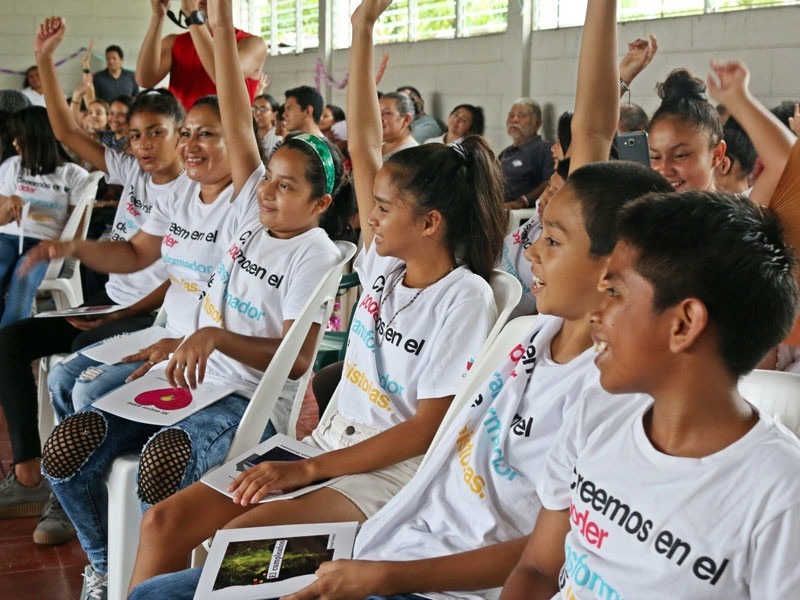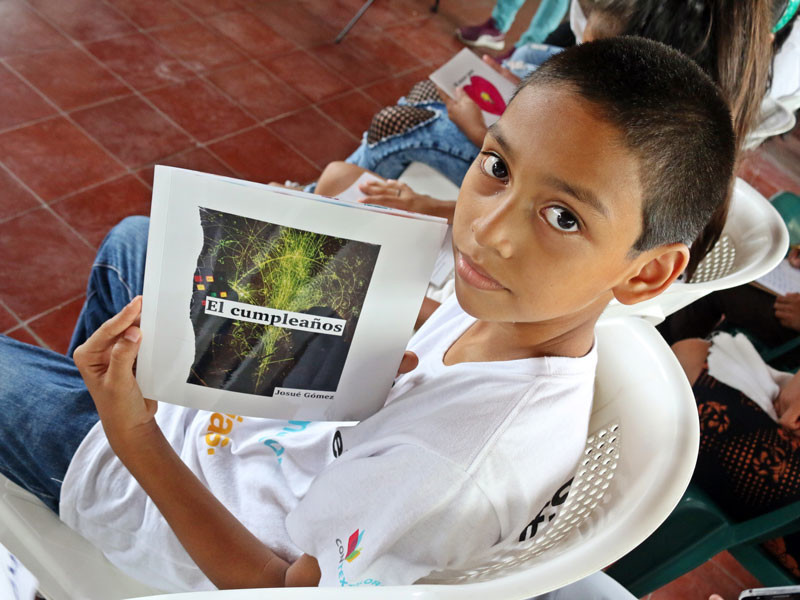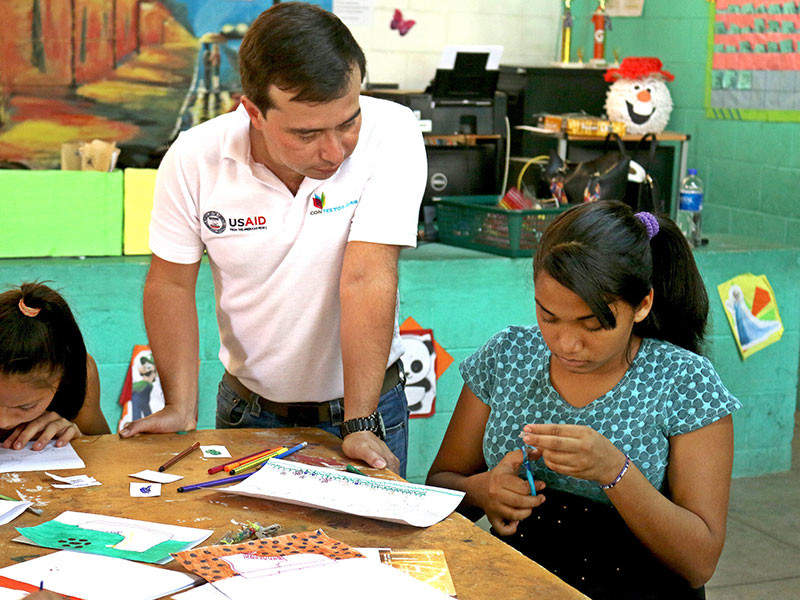Writing for resilience: Young Salvadoran authors share their stories
By Evelyn Rupert and Gerson LaraSeptember 13, 2018
At a town hall in La Libertad, El Salvador, a group of youth authors proudly hold their newly printed books, flipping through pages they wrote themselves.
For five months, 89 youth wrote, edited and illustrated these books, putting stories and experiences from their own lives down on paper. Josué wrote about a birthday. Rebeca wrote about friendships, both good and bad. Others wrote about love, soccer, family, school and “An Unforgettable Day.”
The authors, ranging in age from 9 to 29, were guided through the writing process by ConTextos and its Soy Autor (“I’m an Author”) initiative, with support from the El Salvador Crime and Violence Prevention Project.
Rene Flores, a Soy Autor participant, says he was motivated to join by the prospect of publishing his own book – and sharing his story as a way to help others.

“It pushed me forward and allowed me to open up my mind and get to know the other people in the workshop,” he says. “I hope that people who read by book can relate and see that whatever they’re going through, they can get past it.”
The Crime and Violence Prevention Project is funded by the U.S. Agency for International Development and implemented by Creative Associates International. The project, in partnership with municipalities, has established more than 160 Outreach Centers across the country to provide opportunities to local youth – in sports, music, art, skill building and more.
The Soy Autor program was brought to five of these Outreach Centers, all in the municipality of Apopa, which has historically been a hotspot of violence in the country.
Rene says that through the 22 writing workshops that took place at the Apopa Centro Outreach Center, he was able to work through the initial difficulty of putting his own words down on paper.
“I overcame some fear I had about speaking, about letting people get to know me and writing about my personal life,” Rene says. “It takes courage to face those challenges and use writing to get things off your chest.”
A safe space to share
For many youth, the writing process provides an opportunity to speak openly about traumatic experiences in a safe space and empathize with others. Soy Autor instructor Jenny Knapp says that in communities that see high levels of crime and violence, she has read stories about youth who have lost loved ones, seen parents incarcerated or witnessed friends being killed.
“Soy Autor provides an opportunity for youth to express those difficult things and to develop their capacity for expression, critical thinking and vulnerability,” she says. “They can share what they often hide, and ultimately turn sadness into something that can be valuable for others.”
That’s exactly what Rene hopes will be the impact of his book when his friends and peers read it for the first time.
“I want to dedicate this book to certain people so that they can be inspired and see that despite the obstacles, you can move forward,” he says. “And that even if they’re going through something difficult, they can overcome it … You fall, but you always get back up and dust yourself off.”

Jonatan Trujillo Garcia, coordinator of the Apopa Centro Outreach Center, says that those participants with tough stories to tell had the support they needed to keep going when the writing got challenging. With the encouragement of the instructors, he was also able to participate and write a book about his graduation – a story that he says helped him recommit to the goals he had set for himself.
“What helped me the most was having that support from the workshop’s instructors, who gave us the strength and the encouragement to be able to tell these stories, because there are some stories that are really difficult, and it’s not easy to have that courage to write them,” he says. “Thanks to this opportunity, we have broken negative ways of thinking and have more courage to be able to talk about our experiences.”
The Crime and Violence Prevention Project’s Karen Duarte, who leads efforts on innovative prevention, says that more than 90 percent of the Soy Autor participants had a high exposure to violence, which can contribute to them continuing the cycle of violence in the future. But the writing initiative helped them cope with those traumatic life events, which can be a risk factor that contributes to the cycle of violence.
“Soy Autor developed in young people the skills to write their own narrative, communicate their life stories and generate empathy,” she says. “Additionally, it’s a form of therapy to address and understand the stresses they’ve experienced and help reduce the risk factors of traumatic events, which, if left unaddressed, can influence that young person to become part of a gang.”
Building empathy and peer support

Jonatan says that at Apopa Centro, he saw firsthand the transformation that occurred as youth were able to remove the “masks” that they often wear and open up to one another and to themselves.
“They supported one another to write the stories and get things off their chest, leaving behind some of those fears that they had, that sadness, and converting into a positive force with which they can help others,” he says.
By introducing youth to a creative outlet, means of self-expression and tool to work through traumatic experiences, Soy Autor equips them with a means of addressing challenges for the rest of their lives.
“We know that Soy Autor is a step,” Knapp says. “We try to turn these youth into readers and writers for life, so that it’s a habit and they know that throughout the course of their lives, no matter what happens, they can find refuge in pencil and paper, and they can tell their experiences and share them.”

